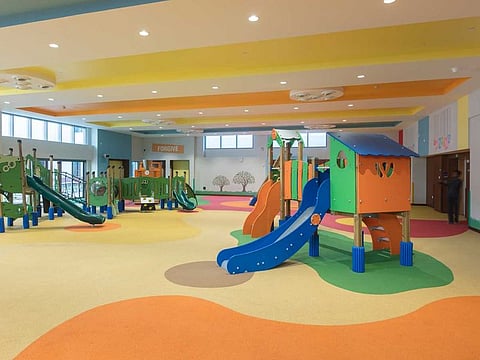A paradigm shift in education
Learning plans at ASCS NAS include the development of the holistic and global learner

In the UAE, the response to cater and accommodate for students in their virtual learning has resulted in a complete paradigm shift in education.
"In September 2020, the transitional process of welcoming students back to school took the form of the hybrid education model to reduce the risk of infection. By September 2021, the academic team in American School of Creative Science (ASCS) Nad Al Sheba ensured that the curriculum preparation and modification considered carefully with thorough planning, takes into account the continuity of learning and the health and safety of the students," says Fatma Khaled, Head of Elementary and Middle School. "Academic planning therefore included careful timetabling of core subjects with well devised modifications that ensure the curriculum is delivered with integrity, is well balanced, and enriched with activities for improved students’ sustained engagement in learning.
The lessons focus on personal and emotional learning targeting self-awareness, self-management, social awareness, relationship skills, digital citizenship, and responsible decision-making.

"We, at ASCS Nad Al Sheba, have looked at multiple assessment tools that provide students with an opportunity to show mastery, and for teachers to highlight the impact of teaching. These include performance, evidence, research-based assessments which are based on a given criterion that allow students to bring concepts being taught in class through analysis, investigation and application. ASCS students are now using coding effectively to create their own digital platforms, and experiments have extended to virtual simulations affording students with learning provisions that are meaningful and relevant to the concept being learnt.
"Learning plans at ASCS Nad Al Sheba include the development of the holistic and global learner with triangulated opportunities such as well-being lessons which have been designed to consider specific students’ needs, based on students’ feedback compiled in the students’ surveys. These are conducted by our academic support team in developing students’ learning skills, build learners’ autonomy and develop resilience in adapting to change, specifically due the unique circumstances. The lessons focus on personal and emotional learning targeting self-awareness, self-management, social awareness, relationship skills, digital citizenship, and responsible decision-making. Furthermore, career and college preparations are included for middle school students in weekly sessions with the guidance of a counsellor using resources like career psychometric tests, one-to-one sessions, and community service as a graduation requirement.
"At ASCS, we look at the pandemic as a catalyst that has opened up multiple opportunities to enrich and extend students’ learning. What we have taken as an imperative lesson is that this pandemic highlights the importance of disseminating knowledge across borders, communities, and all parts of society. If digitalising education and the use of learning technology play a role in educational systems and processes, it is then incumbent upon all of us to explore its full potential."
“INCLUSION IS CONTINUOUSLY AT THE HEART OF ALL OUR PRACTICES”
“With students of determination spending the majority of time with their peers, inclusion is continuously at the heart of all our practices,” says Umar Naeem, Head of Inclusion at the International School of Creative Science (ISCS), Nad Al Sheba.
“The inclusion team at ISCS is passionate about removing all barriers that may arise in terms of learning and accessing all the wonderful activities at the school, ensuring that no child is left behind.
No potential student is refused admission based on their Special Educational Needs and Disabilities (SEND) diagnosis.

“The highly qualified teachers and assistants at ISCS NAS are experienced practitioners and receive training that empowers them to provide a differentiated curriculum, with the aim to stretch and challenge the children they work with, enabling quantifiable progress in the classroom.
“No potential student is refused admission based on their Special Educational Needs and Disabilities (SEND) diagnosis. Students receive individualised and specific targets, that are regularly reviewed, and strategically support is withdrawn incrementally, aiming to empower these students to be independent.”



![Social media claims of cancellations dismissed; official updates to be shared through authorised channels. [Illustrative image]](http://media.assettype.com/gulfnews%2F2025-11-15%2Fx2mp12df%2Fexam.jpg?w=320&auto=format%2Ccompress&fit=max)